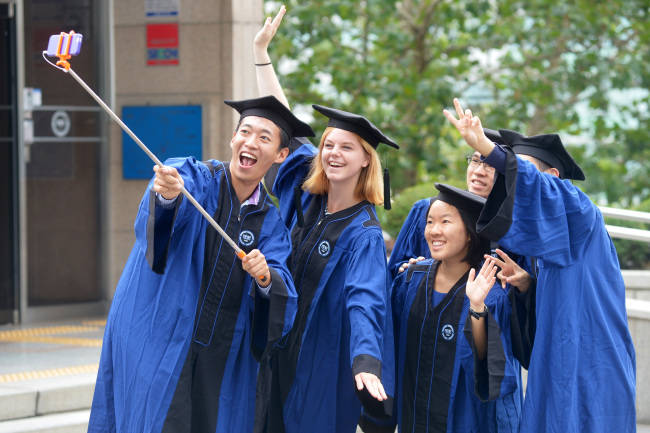College seniors have many things on their minds.
From midterm grades and postgraduate plans to love interests, twentysomethings go through some busy years. In Korea, taking graduation album photos adds to that lengthy to-do list before they can walk in their cap and gown.
Seniors dress up in glittering suits with full makeup, aiming for a look worthy of an A-lister. They pose for photographs on their campus in the spring or fall, three or four months before commencement.
 |
| Graduates take selfies after their commencement ceremony at Hanyang University in Seoul in July. (Yonhap) |
The thick album, which only contains pictures of the graduating class, is a decades-long tradition that commemorates graduation, preserves memories and at the same time flaunts students’ looks.
Nham Jea-hyun, a senior who will graduate from a Seoul-based university in late August, took her graduation album photo in April.
“It’s a once-in-a-lifetime event,” she said. “Getting professional makeup and hair done and taking pictures was something new and fun, but doing it together with friends made it more meaningful.”
Nham spent about 50,000 won ($42) for her makeup and hair session at a salon near Ewha Womans University in western Seoul, on a shopping street saturated with famous hair and makeup shops. She went with her friends and got a special promotion, the “graduation album package” — which includes hair and makeup at a discounted price when booking as a group.
For the attire, she wore a navy dress and white jacket from her closet, instead of shopping for a brand new outfit. She paid another 50,000 won for the photography fee.
Nham is regarded as a modest spender in this graduation album business.
Some graduates get their makeup and hair done at posh salons in Gangnam district — where high-profile celebrities go — and spend around 200,000 won or more.
In addition, buying nice, designer clothes can add a few hundred dollars to the bill.
“It was expensive,” said Kim Jin-hee, 24, who spent 400,000 won on new clothes for the photos. “But I will wear these suits in the future for a job interview or other professional settings. So it would be worth it.”
“Guys get their makeup and hair done, too,” said a staff member of a famous salon in Ewha Womans University district. “We start as early as 6 in the morning during the graduation album season.”
Some easily spend more than 1 million won for the occasion. However, in recent years, a growing number of students decide not to take the pictures at all.
At Hanyang University in Seoul, only 1,050 students purchased the album in 2014, down from 1,800 in 2012. The participation rate of the graduating class plummeted from 48 percent to 28 percent in that period.
Similarly, at Hankuk University of Foreign Studies, the number nearly halved to 524 students in 2014 from 1,000 in 2012. The senior students’ participation rate also halved to 31 percent.
Jo Jin-hyung, a 29-year-old office worker, was one senior who opted out of the photo session when he graduated three years ago.
“Many of my friends weren’t graduating at the same time with me,” he said. “I didn’t want to take pictures beside people I didn’t know too well. There was no point in spending that much money on something that I would not look at frequently.”
In Korea, students do not always graduate with the same classmates they entered college with. All able-bodied men must serve mandatory military service for two years, which often happens during the university years. Also, many students postpone their graduation to avoid entering the job market.
Some students also worry that their personal information will be exposed through the album.
In the past, more so than now, graduation albums served a unique purpose of finding Mr. or Mrs. Right.
Graduates from prestigious universities would get a phone call from matchmakers to introduce them to eligible bachelors or bachelorettes. The matchmakers would go through photos of the graduates and ransack the contact list on the back of the album to dial up the “marriage material.”
But things have changed.
“We don’t use graduation albums for matchmaking purposes,” said an official of Duo, one of the top-tier matchmaking agencies in Korea. “It’s against the privacy act and if I am aware, graduation albums don’t have phone numbers anymore.”
By Ahn Sung-mi (sahn@heraldcorp.com)

